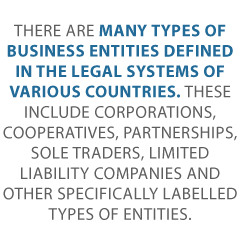- Connect With Us!
- (877) 600-2487
- info@creditsuite.com
Which Business Entity is Best for You?
Published By Credit Suite at October 15th, 2014
What is a Business Entity?
A business entity is a commercial, corporate and/or other institution that is formed and administered as per commercial law in order to engage in business activities, usually for the sale of a product or a service. Basically, an entity is what allows you the ability by law to conduct business.
There are many types of business entities defined in the legal systems of various countries. These include corporations, cooperatives, partnerships, sole traders, limited liability companies and other specifically labelled types of entities. Each country has its own type of entities that can be filed for so a company can be created and operate.
The Sole Proprietorship Business Entity
A Sole Proprietorship is a business consisting of a single owner, not in a separately recognized business form. A sole proprietorship, also known as the sole trader or simply a proprietorship, is a type of business entity that is owned and run by one individual or one legal person (e.g. corporation, LLC) and in which there is no legal distinction between the owner and the business. Basically, the person IS the business.
The owner receives all profits (subject to taxation specific to the business) and has unlimited responsibility for all losses and debts. Every asset of the business is owned by the proprietor and all debts of the business are the proprietor’s. It is a “sole” proprietorship in contrast with partnerships (which have at least two owners). With a sole proprietor YOU are liable for your business debts because YOU are the business.
The Partnership Business Entity
A General Partnership is a partnership in which all the partners are jointly liable for the debts of the partnership. It is a partnership in which partners share equally in both responsibility and liability. Liability for business debts is much the same as a sole proprietorship but there are multiple “partners” involved instead of just one person.
The assets of the business are owned on behalf of the partners, and they are each personally liable jointly for business debts, taxes and liability. For example, if a partnership defaults on a payment to a creditor, the partners’ personal assets are subject to attachment and liquidation to pay the creditor.
By default, profits are shared equally amongst the partners. However, a partnership agreement will almost invariably expressly provide for the manner in which profits and losses are to be shared. Each general partner is deemed the agent of the partnership. Therefore, if that partner is apparently carrying on partnership business, all general partners can be held liable for his dealings with third persons.
The Limited Partnership Business Entity
A Limited Partnership is a partnership where at least one partner has unlimited liability and one or more partners have limited liability. A limited partnership is a form of partnership similar to a general partnership, except that in addition to one or more general partners (GPs) there are one or more limited partners. It is a partnership in which only one partner is required to be a general partner.
Like shareholders in a corporation, limited partners have limited liability. This means they have no management authority and are only liable on debts incurred by the firm to the extent of their registered investment.
The GPs pay the LPs a return on their investment (similar to a dividend), the nature and extent of which is usually defined in the partnership agreement. General partners thus carry more liability, and in cases of financial loss, the GPs will be the ones which are liable. Limited partnerships are distinct from limited liability partnerships, in which all partners have limited liability. In some jurisdictions, the limited liability of the LPs is contingent on their not participating in management.
The Limited Liability Partnership Business Entity
A Limited Liability Partnership is a partnership where a partner’s liability for the debts of the partnership is limited except in the case of liability for acts of professional negligence or malpractice. In some states, LLPs may only be formed for purposes of practicing a licensed profession, typically attorneys, accountants and architects. This is often the only form of limited partnership allowed for law firms (as opposed to general partnerships).
A limited liability partnership (LLP) is a partnership in which some or all partners (depending on the jurisdiction) have limited liabilities. It, therefore, exhibits elements of partnerships and corporations. In an LLP, one partner is not responsible or liable for another partner’s misconduct or negligence. This is an important difference from the traditional unlimited partnership, in which each partner has joint liability. In an LLP, some partners have a form of limited liability similar to that of the shareholders of a corporation.
The Limited Liability Limited Partnership Business Entity
A Limited Liability Limited Partnership is a combination of LP and LLP, available in some states. The limited liability limited partnership (LLLP) is a relatively new modification of the limited partnership. An LLLP is a limited partnership and as such consists of one or more general partners and one or more limited partners. The general partners manage the LLLP, while typically the limited partners only have a financial interest.
The difference between an LLLP and a traditional limited partnership lies in the general partner’s liability for the debts and obligations of the limited partnership. In a traditional limited partnership the general partners are jointly liable for its debts and obligations; limited partners are not liable for those debts and obligations beyond the amount of their capital contributions.
The Limited Liability Company Business Entity
A Limited Liability Company (LLC) is a form of business whose owners enjoy limited liability, but which is not a corporation. A limited liability company is a flexible form of enterprise that blends elements of partnership and corporate structures. An LLC is not a corporation; it is a legal form of company that provides limited liability to its owners. LLCs do not need to be organized for profit.
In certain US states, businesses that provide professional services requiring a state professional license, such as legal or medical services, may not be allowed to form an LLC but required to form a very similar entity called a Professional Limited Liability Company (PLLC).
A limited liability company (LLC) is a hybrid business entity having certain characteristics of both a corporation and a partnership or sole proprietorship (depending on how many owners there are). An LLC, although a business entity, is a type of unincorporated association and is not a corporation.
The primary characteristic an LLC shares with a corporation is limited liability, and the primary characteristic it shares with a partnership is the availability of pass-through income taxation. It is often more flexible than a corporation, and it is well-suited for companies with a single owner.
The Corporation Business Entity
A corporation is a separate legal entity that has been incorporated either directly through legislation or through a registration process established by law. Incorporated entities have legal rights and liabilities that are distinct from their employees, shareholders, and members, and may conduct business as either a profit-seeking business or not-for-profit. Despite not being human beings, corporations, as far as the law is concerned, are legal persons, and have many of the same rights and responsibilities as natural people do.
A corporation may be either a Subchapter S Corporation or a C corporation. An S corporation is a corporation that makes a valid election to be taxed under Subchapter S of Chapter 1 of the Internal Revenue Code. In general, S corporations do not pay any federal income taxes. Instead, the corporation’s income or losses are divided among and passed through to its shareholders. The shareholders must then report the income or loss on their own individual income tax returns.
The S Corporation Business Entity
S corporations are ordinary business corporations that elect to pass corporate income, losses, deductions, and credit through to their shareholders for federal tax purposes. S status combines the legal environment of C corporations with U.S. federal income taxation similar to that of partnerships. Like a C corporation, an S corporation is generally a corporation under the law of the state in which the entity is organized.
Taxation of S corporations resembles that of partnerships. As with partnerships, the income, deductions, and tax credits of an S corporation flow through to shareholders annually, regardless of whether distributions are made. Thus, income is taxed at the shareholder level and not at the corporate level.
The C Corporation Business Entity
C corporation refers to any corporation that is taxed separately from its owners. The C corporation is distinguished from an S Corporation, which generally is not taxed separately. Most major companies (and many smaller companies) are treated as C corporations for U.S. federal income tax purposes.
Professional corporations are those corporate entities for which many corporation statutes make special provision, regulating the use of the corporate form by licensed professionals such as attorneys, architects, engineers, public accountants, and physicians. Legal regulations applying to professional corporations typically differ in important ways from those applying to other corporations.
The DBA (Not a Business Entity)
Doing Business As (DBA) denotes a business name used by a person or entity that is different from the person’s or entity’s true name. Filing rudiments vary and are not permitted for some types of businesses or professional practices. DBAs can be sole proprietorships or can be used by corporate entities to reserve “brand names”, such as those of chain stores owned and operated by a holding company or other “umbrella”.
The phrase “doing business as” (abbreviated DBA, dba, d.b.a. or d/b/a) is a legal term used in the United States and Canada, meaning that the trade name or fictitious business name under which the business or operation is conducted and presented to the world is not the legal name of the legal person(s) who actually owns the business and is responsible for it.
Choosing the best entity for your business is essential to get the best tax benefits while reducing your personal liability.

 " class="attachment-blog-single size-blog-single wp-post-image" alt="Get Business Credit Cards for New Businesses Credit Suite-Business Line of Credit Decoded" title="Get Business Credit Cards for New Businesses">>
" class="attachment-blog-single size-blog-single wp-post-image" alt="Get Business Credit Cards for New Businesses Credit Suite-Business Line of Credit Decoded" title="Get Business Credit Cards for New Businesses">>